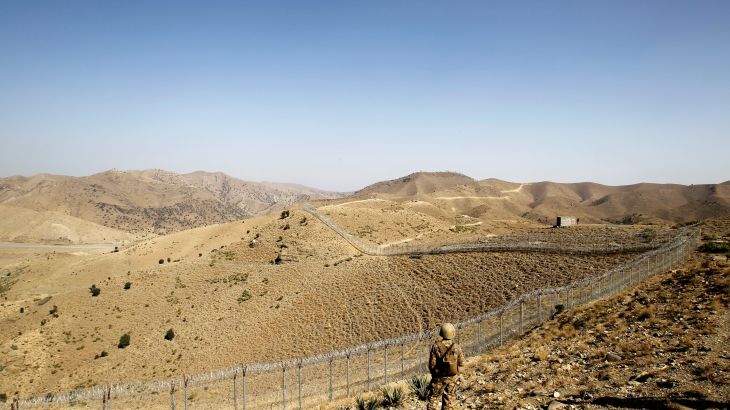Abid Hussain

Pakistan has launched overnight air attacks inside Afghanistan, while the Taliban claimed hours later to have fired across the border.
Tensions flared on Monday between Islamabad and Kabul following the overnight raids. Pakistan said the attack had targeted armed groups hiding out in border regions. The Taliban said eight women and children were killed.
The Afghan defence ministry claimed later on Monday to have fired across the border at Pakistan positions. Islamabad has not yet commented on the claim.
Pakistani military and foreign ministry sources confirmed to Al Jazeera that the “retaliatory” attacks had targeted the hideouts of commanders of the Tehreek-e-Taliban Pakistan (TTP), or Pakistani Taliban, due to “terrorist activities being sponsored and conducted from across border”.
They offered few details. However, on Saturday, a group of suicide bombers targeted a military check post in Pakistan’s North Waziristan district in the Khyber Pakhtunkhwa province, which neighbours Afghanistan, killing seven soldiers.
Afghanistan’s interim government said the Pakistani jets had hit the houses of “ordinary people” in Paktika and Khost provinces. They reported that at least eight people were killed; five women and three children.
In a statement issued on X, government spokesman Zabihullah Mujahid said the individual Pakistan claimed to have targeted continues to live in Pakistan.
Kabul “strongly condemns” the “reckless action” which is a violation of Afghanistan territory, he continued.
“The Islamic Emirate of Afghanistan, which has a long experience of freedom struggle against the superpowers of the world, does not allow anyone to invade its territory,” the post read.
Tension has risen between Pakistan and Afghanistan since the Taliban government seized power in 2021. Islamabad claims that hostile armed groups carry out regular attacks from across the border.
Afghanistan reported in April 2022 that Pakistani air strikes in the east of the country killed 47 people.
Analysts suggest that Monday’s strike can be linked to the suicide attack two days ago, which was claimed by a newly formed group, Jaish-e-Fursan-e-Muhammad, which is led by Hafiz Gul Bahadur, leader of a Pakistani Taliban faction based in North Waziristan.
In response, Pakistan’s Defence Minister Khawaja Asif repeated the claim that armed groups are using Afghan soil from which to launch terrorist attacks inside Pakistan.
“Terrorism against us is mostly being conducted from Afghanistan,” he said on Sunday.
It’s a charge the Afghan Taliban has repeatedly denied.
“We reject the presence of any … foreign groups in Afghanistan and they are not allowed to operate on Afghan soil. In this regard, we have made our utmost effort and continue to do so; but one thing we must accept is that Afghanistan shares a very long border area with Pakistan, and there are places with rugged terrain including mountains and forests, and places that might be out of our control,” Mujahid said in response.
Bloody year
Last year was bloody in Pakistan, with more than 650 attacks reported across the country, resulting in the deaths of nearly 1,000 people, most of whom were security personnel.
Most attacks targeted the western provinces of Khyber Pakhtunkhwa and Balochistan, which border Afghanistan.
While there have been various armed groups which have conducted acts of violence in Pakistan, the state’s main adversary has been the TTP, which is ideologically aligned with the Afghan Taliban.
Since its founding in 2007, the TTP has targeted civilians and law enforcement personnel in Pakistan, resulting in thousands of deaths.
The group demands the imposition of their hardline interpretation of Islamic laws, as well as a reversal of Pakistan’s decision to merge their tribal areas with the Khyber Pakhtunkhwa province.
Abdul Sayed, a Sweden-based researcher on armed groups in South and Central Asia, says Pakistan’s air strikes on Monday appear to be a response to the suicide attack two days previously.
“The attack in North Waziristan was extraordinarily large, reportedly involving six suicide bombers and a large truck bomb. The presence of top Pakistani officials, including the president and army chief, at the funerals, suggested potential future cross-border actions by Pakistan,” he told Al Jazeera.
Muhammad Amir Rana, an Islamabad-based security analyst and director of the Pakistan Institute of Peace Studies (PIPS) says it is not unusual for the TTP or other armed groups to launch attacks during the month of Ramadan.
“The state institutions have now adopted a tit-for-tat response to any threats. The Taliban are known to support the TTP, and there have been instances of their own members being involved in attacks in Pakistan,” he told Al Jazeera.
It has also been noted that the sharp response of Pakistan against targets in Afghanistan is similar in nature to its reaction to January’s cross-border attacks by Iran.
However, Rana suggests that the possibility of retaliatory attacks on targets in Pakistan following Monday’s air raids cannot be dismissed.
“Unless diplomatic channels are activated, tensions between the two countries are likely to escalate in the coming weeks,” he cautioned.
No comments:
Post a Comment